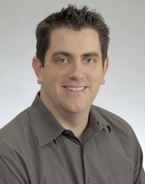Outcrops as Analogs: Chris Zahm studies outcrops as analogs for subsurface reservoirs to better understand how fractures and non-matrix pores affect oil and gas flow
September 4, 2007

Chris Zahm joined the Bureau of Economic Geology’s Reservoir Characterization Research Laboratory in January 2007, where he works on fractures and non-matrix pores in carbonate reservoirs.
Zahm looks at outcrops as an analog for subsurface reservoirs, building models based on the outcrops to be able to run tests to determine how fractures and karst-type systems might impact flow. This applied energy research is supported by oil and gas companies seeking to better understand their own reservoirs.
“The reservoir type I specifically work on is where we see high-permeability zones,” Zahm said. “These are often times related to factures or other non-matrix pores, like touching vugs or karst. These zones present problems during enhanced hydrocarbon recovery. It can be very helpful to see these systems in outcrops where the full heterogeneity is present and to visualize what the sub surface might look like.”
Zahm is currently doing research on outcrops in Central Texas, West Texas, Wyoming, and New Mexico’s Guadalupe Mountains.
“What most interests me are the application and integration of rock mechanics, stratigraphy, and structural geology with reservoir engineering,” Zahm said. “It’s the way those four pieces combine. Classically those are four sub-disciplines, but it’s the integrated analysis across the four disciplines that becomes very interesting.”
After earning his Ph.D. from the Colorado School of Mines in 2002, Zahm joined ConocoPhillips Subsurface Technology as a structural geologist where he worked on reservoirs around the world, primarily in the North Sea and Southeast Asia.
For more information about the Jackson School contact J.B. Bird at jbird@jsg.utexas.edu, 512-232-9623.
